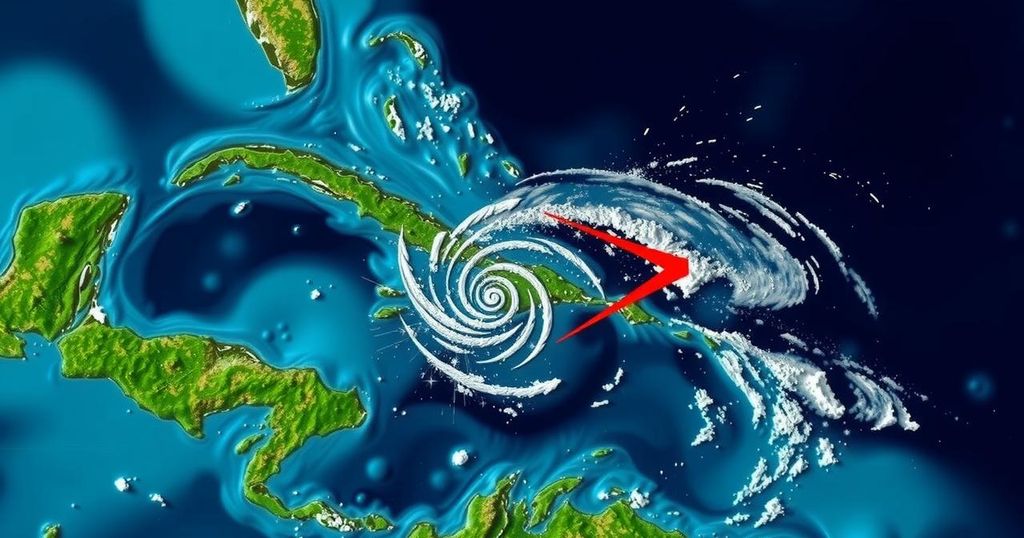Tropical Storm Oscar Heads Toward the Bahamas After Impacting Cuba

Tropical Storm Oscar moved toward the Bahamas after hitting Cuba as a Category 1 hurricane, leading to at least six fatalities. Located 45 miles from Long Island, it has weakened to a tropical storm with anticipated rainfall up to 8 inches in certain areas. Oscar is noted for its status as the smallest recorded hurricane, raising concerns about hurricane forecasting accuracy. The storm contributes to the ongoing challenges Cuba faces due to a recent massive power outage.
Tropical Storm Oscar has made its way towards the Bahamas following its landfall in Cuba, where it was classified as a Category 1 hurricane. The storm has caused the deaths of at least six individuals while bringing torrential rainfall to an island recently affected by a significant power outage. On Tuesday morning, Oscar was situated approximately 45 miles (75 kilometers) south-southeast of Long Island in the Bahamas, exhibiting wind speeds of 40 mph (65 kph) and progressing north-northeast at 12 mph (19 kph), according to the National Hurricane Center in Miami. The storm is currently at a reduced strength, being described as “barely a tropical storm” by the weather center. It is anticipated that Oscar will deposit between 5 and 8 inches (13 to 20 centimeters) of rain across the southeastern Bahamas, prompting a tropical storm warning for the central and southeastern regions of the island chain. Notably, Oscar has set a record as the smallest hurricane ever recorded, with a wind field measuring approximately 6 miles (10 kilometers) in diameter. Its unexpected intensification surprised meteorologists, with hurricane specialist Michael Lowry highlighting a “colossal failure in hurricane forecasting,” as none of the predictive models had indicated the storm would escalate into a hurricane. Significant rainfall has also impacted eastern Cuba, where Oscar dropped a staggering 15 inches (38 centimeters) on Monday. Forecasters have issued warnings regarding the risks of severe flooding and potential landslides, with the fatalities occurring in Guantánamo. This storm has struck at a challenging moment for Cuba, which is still recovering from widespread power outages that have led to public unrest and government warnings against protests. Oscar represents the 15th named storm and the 10th hurricane of the Atlantic hurricane season, which officially runs from June 1 until November 30. The National Oceanic and Atmospheric Administration has forecasted an above-average hurricane season, anticipating between 17 and 25 named storms, with several predicted to reach major hurricane status. In related news, Tropical Storm Kristy is currently positioned over open waters in the Pacific Ocean.
The Atlantic hurricane season occurs annually from June 1 through November 30, during which tropical storms and hurricanes often affect coastal regions. This year, the National Oceanic and Atmospheric Administration has predicted an above-average season due to elevated ocean temperatures. The Bahamas and Cuba are especially vulnerable regions that frequently experience severe weather events, with past hurricanes leading to significant impacts on infrastructure and safety. The rapid intensification of tropical storms into hurricanes can complicate forecasts, leading to potentially dire consequences for the populations affected. Recent events such as Oscar have drawn attention to the challenges of accurate forecasting in the face of climate variability.
In conclusion, Tropical Storm Oscar has transitioned from a hurricane to a tropical storm as it moves towards the Bahamas, following a devastating impact in Cuba. The storm has not only claimed lives but also exacerbated the situation in a country already facing challenges due to power shortages. Forecasters caution areas within the storm’s path about heavy rain and flooding, emphasizing the need for continued vigilance as the hurricane season progresses with above-average storm predictions. Oscar serves as a reminder of the unpredictability of weather events and the importance of preparedness in the face of these natural disasters.
Original Source: www.washingtontimes.com






